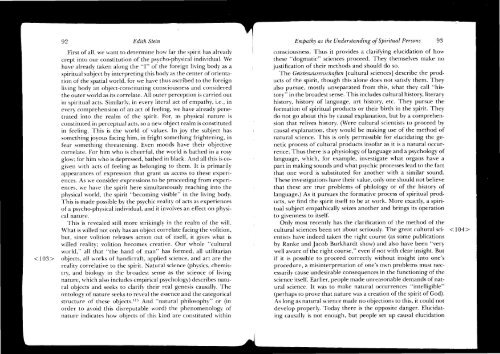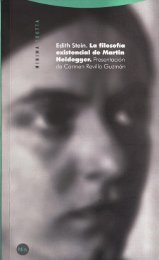The Collected Works of EDITH STEIN ON THE PROBLEM OF EMPATHY
Create successful ePaper yourself
Turn your PDF publications into a flip-book with our unique Google optimized e-Paper software.
92 Edith Stein<br />
First <strong>of</strong> all, \{e want to determirre how f ar the spint has already<br />
crept into our constitution <strong>of</strong> the psycho-physical individual. We<br />
have already taken along the "I" <strong>of</strong> the foreign living body as a<br />
spiritual subject by interpreting this body as the center <strong>of</strong> orientation<br />
<strong>of</strong> the spatial u'orld, for we have thus ascribed to the foreign<br />
living body an object-constituting consciousness and considered<br />
the outer world as its cr>rrelate. All outer perception is carried out<br />
in spiritual acts. Similarly, in every literal act <strong>of</strong> empathy, i.e., in<br />
every comprehension <strong>of</strong> an act <strong>of</strong> feeling, we have already penetrated<br />
into the realm <strong>of</strong> the spirit. For, as physical nature is<br />
constituted in perceptual acts, so a new object realm is constituted<br />
in feeling. This is the r.r'orld <strong>of</strong> values. In joy the subject has<br />
sonrething joyous facing him, in fright something frightening. in<br />
fear something threatening. Even moods have their objective<br />
correlate. For him u'ho is cheerful, the world is bathed in a rosy<br />
glow; {br him n'ho is depressed, bathed in black. And all this is cogiven<br />
u'ith acts <strong>of</strong> feeling as belonging to them. It is primarily<br />
appearances <strong>of</strong> expression that grant Lls access to these erperiences.<br />
As we consider expressions to be proceeding from experiences,<br />
we have the spirit here simultaneously reaching into the<br />
physical world, the spirit "becoming visible" in the living body.<br />
This is made possible by the psychic reality <strong>of</strong> acts as experiences<br />
<strong>of</strong> a ps1'cho-physical individual, and it involves an effect on physical<br />
nature.<br />
This is revealed still more strikinglv in the realm <strong>of</strong> the will.<br />
What is willed not only has an object correlate facing the volition,<br />
but, since volition releases action out <strong>of</strong> itself, it gives what is<br />
willed reality; volition becomes creative. Our whole "cultural<br />
world," all that "the hand <strong>of</strong> man" has formed, all utilitarian<br />
objects, all works c-rf handicraft, applied science, and art are the<br />
realit,r' correlative to the spirit. Natural science (phvsics, chemistry,<br />
arrd biology in the broadest sense as the science <strong>of</strong> living<br />
nature, which also includes empirical psychology) describes natural<br />
objects and seeks to clarify their real genesis causally.<br />
'I'he<br />
ontology <strong>of</strong>nature seeks to reveal the essence and the categorical<br />
structure <strong>of</strong> these objects.rr5 And "natr,rral philosophy" or (in<br />
order to avoid this disreputable rvord) the phenomenology <strong>of</strong><br />
nature indicates horv objects <strong>of</strong> this kind are constituted within<br />
Empathy as the Understanding <strong>of</strong> Spiritual Persons 93<br />
cor-rsciousness. Thus it provides a clarifying elucidation <strong>of</strong> how<br />
these "dogmatic" sciences proceed. -fhey themselves make no<br />
iustification <strong>of</strong> their methods and should do so.<br />
<strong>The</strong> Geisteswissenschaften [cultural sciences] describe the products<br />
<strong>of</strong> the spirit, though this alone does not satisfy them. <strong>The</strong>y<br />
also pursue, mostly unseparated from this, u'hat they call "histor1"'<br />
in the broadest sense. This ir-rcludes cultural history, literary<br />
history, history <strong>of</strong> language, art history, etc. <strong>The</strong>y pursue the<br />
formation <strong>of</strong> spiritual products or their birth in the spirit. <strong>The</strong>l<br />
do not go about this by causal explanation, but by a comprehension<br />
that relives history. (Were cultural scientists to proceed by<br />
causal explanation, they rvould be making use <strong>of</strong> the method <strong>of</strong><br />
natural science. This is only permissible for elucidating the genetic<br />
process <strong>of</strong> cultural products ins<strong>of</strong>ar as it is a natural occurrence.<br />
Thus there is a physiology <strong>of</strong> language and a psychology <strong>of</strong><br />
language, r,r'hich, for example, investigate what organs have a<br />
part in making sounds and what psychic processes lead to the fact<br />
that one word is substituted for another with a similar sound.<br />
<strong>The</strong>se investigations have their vah.re, only one should not believe<br />
that these are true problems <strong>of</strong> philology or <strong>of</strong> the history <strong>of</strong><br />
language.) As it pursues the formative process <strong>of</strong> spiritual products,<br />
we find the spirit itself to be at work. More exactly, a spiritual<br />
subject empathically seizes another and brings its operation<br />
to giverrness to itself.<br />
Only most recently has the clarification <strong>of</strong> the method <strong>of</strong> the<br />
cultural sciences been set about seriously. <strong>The</strong> great cultural sci- <br />
entists have indeed taken the right course (as some publications<br />
by Ranke andJacob Burkhardt show) and also have been "very<br />
well aware <strong>of</strong> the right course," even if not with clear insight. But<br />
if it is possible to proceed correctly without insight into one's<br />
procedure, a misinterpretation <strong>of</strong> one's own problems must necessarily<br />
cause undesirable consequences in the functioning <strong>of</strong> the<br />
science itself. Earlier, people made unreasonable demands <strong>of</strong> natural<br />
science. It was to make natural occurrences "intelligible"<br />
(perhaps to prove that nature was a creation <strong>of</strong> the spirit <strong>of</strong> God).<br />
As long as natural science made no objections to this, it could not<br />
develop properly. Today there is the opposite danger. Elucidating<br />
causally is not enough, but people set up causal elucidation

















